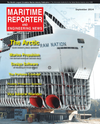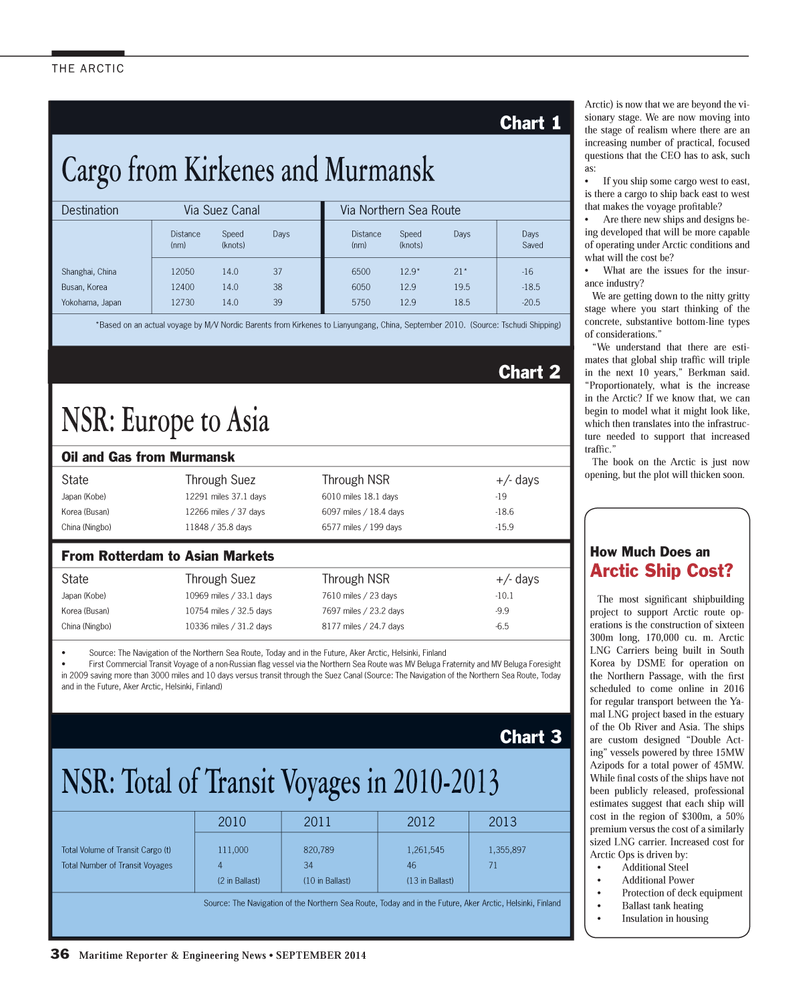
Page 36: of Maritime Reporter Magazine (September 2014)
Marine Propulsion Edition
Read this page in Pdf, Flash or Html5 edition of September 2014 Maritime Reporter Magazine
36 Maritime Reporter & Engineering News • SEPTEMBER 2014
THE ARCTIC
Arctic) is now that we are beyond the vi- sionary stage. We are now moving into the stage of realism where there are an increasing number of practical, focused questions that the CEO has to ask, such as: • If you ship some cargo west to east, is there a cargo to ship back east to west that makes the voyage profi table? • Are there new ships and designs be- ing developed that will be more capable of operating under Arctic conditions and what will the cost be? • What are the issues for the insur- ance industry?
We are getting down to the nitty gritty stage where you start thinking of the concrete, substantive bottom-line types of considerations.” “We understand that there are esti- mates that global ship traffi c will triple in the next 10 years,” Berkman said. “Proportionately, what is the increase in the Arctic? If we know that, we can begin to model what it might look like, which then translates into the infrastruc- ture needed to support that increased traffi c.”
The book on the Arctic is just now opening, but the plot will thicken soon.
Cargo from Kirkenes and Murmansk
Destination Via Suez Canal Via Northern Sea Route Distance Speed Days Distance Speed Days Days (nm) (knots) (nm) (knots) Saved
Shanghai, China 12050 14.0 37 6500 12.9* 21* -16
Busan, Korea 12400 14.0 38 6050 12.9 19.5 -18.5
Yokohama, Japan 12730 14.0 39 5750 12.9 18.5 -20.5 *Based on an actual voyage by M/V Nordic Barents from Kirkenes to Lianyungang, China, September 2010. (Source: Tschudi Shipping)
NSR: Europe to Asia
Oil and Gas from Murmansk
State Through Suez Through NSR +/- days
Japan (Kobe) 12291 miles 37.1 days 6010 miles 18.1 days -19
Korea (Busan) 12266 miles / 37 days 6097 miles / 18.4 days -18.6
China (Ningbo) 11848 / 35.8 days 6577 miles / 199 days -15.9
From Rotterdam to Asian Markets
State Through Suez Through NSR +/- days
Japan (Kobe) 10969 miles / 33.1 days 7610 miles / 23 days -10.1
Korea (Busan) 10754 miles / 32.5 days 7697 miles / 23.2 days -9.9
China (Ningbo) 10336 miles / 31.2 days 8177 miles / 24.7 days -6.5 Source: The Navigation of the Northern Sea Route, Today and in the Future, Aker Arctic, Helsinki, Finland First Commercial Transit Voyage of a non-Russian fl ag vessel via the Northern Sea Route was MV Beluga Fraternity and MV Beluga Foresight in 2009 saving more than 3000 miles and 10 days versus transit through the Suez Canal (Source: The Navigation of the Northern Sea Route, Today and in the Future, Aker Arctic, Helsinki, Finland)
NSR: Total of Transit Voyages in 2010-2013 2010 2011 2012 2013
Total Volume of Transit Cargo (t) 111,000 820,789 1,261,545 1,355,897
Total Number of Transit Voyages 4 34 46 71 (2 in Ballast) (10 in Ballast) (13 in Ballast)
Source: The Navigation of the Northern Sea Route, Today and in the Future, Aker Arctic, Helsinki, Finland
How Much Does an
Arctic Ship Cost?
The most signifi cant shipbuilding project to support Arctic route op- erations is the construction of sixteen 300m long, 170,000 cu. m. Arctic
LNG Carriers being built in South
Korea by DSME for operation on the Northern Passage, with the fi rst scheduled to come online in 2016 for regular transport between the Ya- mal LNG project based in the estuary of the Ob River and Asia. The ships are custom designed “Double Act- ing” vessels powered by three 15MW
Azipods for a total power of 45MW.
While fi nal costs of the ships have not been publicly released, professional estimates suggest that each ship will cost in the region of $300m, a 50% premium versus the cost of a similarly sized LNG carrier. Increased cost for
Arctic Ops is driven by: • Additional Steel • Additional Power • Protection of deck equipment • Ballast tank heating • Insulation in housing
Chart 1
Chart 2
Chart 3
MR #9 (34-39).indd 36 9/4/2014 3:46:11 PM

 35
35

 37
37
